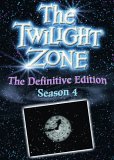| Reviews & Columns |
|
Reviews DVD TV on DVD Blu-ray 4K UHD International DVDs In Theaters Reviews by Studio Video Games Features Collector Series DVDs Easter Egg Database Interviews DVD Talk Radio Feature Articles Columns Anime Talk DVD Savant Horror DVDs The M.O.D. Squad Art House HD Talk Silent DVD
|
DVD Talk Forum |
|
|
| Resources |
|
DVD Price Search Customer Service #'s RCE Info Links |
|
Columns
|
|
|
Twilight Zone - Season 4 (The Definitive Edition), The
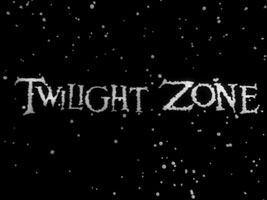
INTRODUCTION:
"You unlock this door with the key of imagination. Beyond it is another dimension, a dimension of sound, a dimension of sight, a dimension of mind. You're moving into a land of both shadow and substance, of things and ideas. You've just crossed over into the Twilight Zone."
After the conclusion of the third season of The Twilight Zone, Rod Serling's iconic show underwent numerous revisions to keep it on the air. The most notable of these changes to the casual viewer was a shift from its highly effective half-hour format to the more experimental hour-long format that was being implemented with other CBS shows, Alfred Hitchcock Presents and Gunsmoke. But behind the scenes, the groundbreaking series was also losing creative talent. Serling, the driving force behind the series, had accepted a teaching job at Antioch College in Yellow Springs, Ohio, and while he wrote many scripts for the season, he was unable to supervise the overall production in the way he had before. Worse, producer Buck Houghton, perhaps the second most important figure in bringing the series to the screen, was forced to take another job when CBS delayed renewing the series. Breaking from its format and operating without much of its driving creative talent, the fourth season of The Twilight Zone (technically renamed to just Twilight Zone) contained 18 rarely syndicated and largely forgettable episodes. They are presented here in Image Entertainment's "definitive" edition.
CONTENT:
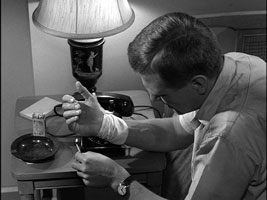 With the departure of producer Buck Houghton, CBS hired Herbert Hirschman to helm the series, and while he tried to retain as much from his predecessors as possible, he did make a notable change to the opening title sequence. Dropping the concentric spiral effect from the previous season and tweaking the narration, this fourth season's episodes open with a series of interesting objects floating through the void of space: a closed door, a shattered window, a detached eyeball (and upper lid), and a ticking clock. It was effective and disorienting, and while viewers rarely remember the episodes from this season, they often remember this opening sequence as the most effective of the show's run. Another notable change to this season was not Hirschman's desire, but was simply done out of necessity. With Serling teaching and writing in Ohio and the show filming in California, The Twilight Zone had to alter Rod's on-screen episodic introductions and scrap the clever use of the given episode's set. Instead, each episode is introduced by Rod either standing or sitting on a stool in front of a blank canvas. While not all of the previous seasons' introductions were exceedingly clever, it was still a fun effect that is now completely lost in the fourth season. Worse, some of the introductions seem intentionally vague, as if Serling's time constraints (filming them in batches when he could make it to town) forced him to film the segment before the script had been finished. While just a small aspect to the overall show, this change underscores Serling's absence and the detachment felt by the viewer while watching these episodes.
With the departure of producer Buck Houghton, CBS hired Herbert Hirschman to helm the series, and while he tried to retain as much from his predecessors as possible, he did make a notable change to the opening title sequence. Dropping the concentric spiral effect from the previous season and tweaking the narration, this fourth season's episodes open with a series of interesting objects floating through the void of space: a closed door, a shattered window, a detached eyeball (and upper lid), and a ticking clock. It was effective and disorienting, and while viewers rarely remember the episodes from this season, they often remember this opening sequence as the most effective of the show's run. Another notable change to this season was not Hirschman's desire, but was simply done out of necessity. With Serling teaching and writing in Ohio and the show filming in California, The Twilight Zone had to alter Rod's on-screen episodic introductions and scrap the clever use of the given episode's set. Instead, each episode is introduced by Rod either standing or sitting on a stool in front of a blank canvas. While not all of the previous seasons' introductions were exceedingly clever, it was still a fun effect that is now completely lost in the fourth season. Worse, some of the introductions seem intentionally vague, as if Serling's time constraints (filming them in batches when he could make it to town) forced him to film the segment before the script had been finished. While just a small aspect to the overall show, this change underscores Serling's absence and the detachment felt by the viewer while watching these episodes.
The first of these hour-longs to air under the Hirschman regime was an adapted script from frequent Zone contributor Charles Beaumont. "In His Image" opens with Alan Talbot (George Grizzard, previously in "The Chaser") entering a lonely subway station in the middle of the night. Here he encounters an elderly religious fanatic who berates him until he ultimately pushes her in front of an oncoming train. This bizarre scene could be the makings of an interesting episode, but the meat of the story almost completely ignores this setup as if Beaumont just tacked it on because he thought it would be fun to toss a woman in front of a train. The rest of the story then focuses on Talbot's trip to his hometown to introduce his girlfriend to his family, but once he arrives, things are not the way he remembered them. What could have been an intriguing psychological drama ultimately rings hollow as it is near impossible to sympathize with the character we met in the opening scene. The first three season premieres of The Twilight Zone maintained a theme of isolation with two strong Serling scripts and one from Montgomery Pittman, but both the theme and the strength of storytelling are lost for this fourth season's first effort. It is not a good sign.
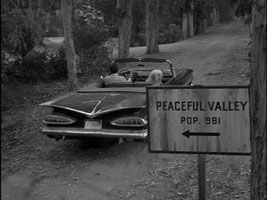 "The Thirty-Fathom Grave" follows with Serling's first script of the season. On a routine mission, a naval destroyer stumbles upon a sunken submarine that is making an oddly persistent clanging sound from within. While the crew is investigating the mystery, Chief Bell (Mike Kellin) complains to shipmates that he feels strangely drawn to the buried vessel. Sunk over 20 years before, it certainly isn't a distress call from any survivors ... or is it? "The Thirty-Fathom Grave" is the first of many episodes that begins with a decent premise but destroys itself under the weight of the hour-long timeframe. Perhaps as a half-hour show, it would pass as moderately entertaining, but as executed it is incredibly tedious as we follow Bell delivering the same drawn out exposition to multiple characters in an apparent effort to fill time. Largely re-treading much of the same territory as the first season's "Judgment Night", Serling's first script for this season is neither compelling nor interesting and is another bad sign of things to come.
"The Thirty-Fathom Grave" follows with Serling's first script of the season. On a routine mission, a naval destroyer stumbles upon a sunken submarine that is making an oddly persistent clanging sound from within. While the crew is investigating the mystery, Chief Bell (Mike Kellin) complains to shipmates that he feels strangely drawn to the buried vessel. Sunk over 20 years before, it certainly isn't a distress call from any survivors ... or is it? "The Thirty-Fathom Grave" is the first of many episodes that begins with a decent premise but destroys itself under the weight of the hour-long timeframe. Perhaps as a half-hour show, it would pass as moderately entertaining, but as executed it is incredibly tedious as we follow Bell delivering the same drawn out exposition to multiple characters in an apparent effort to fill time. Largely re-treading much of the same territory as the first season's "Judgment Night", Serling's first script for this season is neither compelling nor interesting and is another bad sign of things to come.
Charles Beaumont contributes his second of many scripts for this season with "Valley of the Shadow", the story of newspaper reporter Philip Redfield (Ed Nelson) who takes a detour into the creepy and isolated town of Peaceful Valley when his car runs out of gas. Strange things happen in this town, it is oddly unoccupied, and it seems as though everyone is intent on avoiding discussion with him and getting him to leave as quickly as possible. Once Redfield learns their secret, however, they won't let him leave. "Valley of the Shadow" avoids total disaster due in large part to the performance of David Opatoshu as the town's conflicted leader, Dorn. Dorn doesn't want to harm the unsuspecting visitor, but circumstances force him into a difficult position. Opatoshu's strong performance aside, however, the plot strains credibility in many ways as the fundamental truth of the town does not match what we actually see in the episode. Worse, the episode's ultimate resolution is an emotional cheat that makes it seem as if the entire effort were unnecessary.
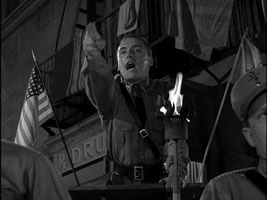 "He's Alive" marks the return of Rod Serling at his preachy worst. A young Dennis Hopper stars as Peter Vollmer, a wannabe neo-Nazi leader who frequently delivers angry tirades to annoyed passersby on his street corner. Vollmer's life changes, however, when the spirit of Hitler himself shows up one day and teaches him how to manipulate a crowd with words and gain popularity for his cause. Hopper's performance in the lead is surprisingly strong, and he carries the weak material as best as possible, but the story just drags on and on with speech after speech, and in the end, it is clear that the hour spent was little more than an excuse for Serling to remind the audience that "He's Alive" as long as we keep him alive with our own prejudice and bigotry. It's a decent message to be sure, but the episode itself is a waste of an hour.
"He's Alive" marks the return of Rod Serling at his preachy worst. A young Dennis Hopper stars as Peter Vollmer, a wannabe neo-Nazi leader who frequently delivers angry tirades to annoyed passersby on his street corner. Vollmer's life changes, however, when the spirit of Hitler himself shows up one day and teaches him how to manipulate a crowd with words and gain popularity for his cause. Hopper's performance in the lead is surprisingly strong, and he carries the weak material as best as possible, but the story just drags on and on with speech after speech, and in the end, it is clear that the hour spent was little more than an excuse for Serling to remind the audience that "He's Alive" as long as we keep him alive with our own prejudice and bigotry. It's a decent message to be sure, but the episode itself is a waste of an hour.
Richard Matheson once more contributes his significant talents to The Twilight Zone with "Mute", a novelette he had previously written and adapted for the show. The story focuses on Ilse Nielsen, the unsuspecting offspring of parents who pledged years before to only communicate with their children through telepathy. How they possess these powers is not addressed; it is simply understood that they do and that their children are not to learn any other form of communication. When Isle's parents are killed in a fire, she is sheltered by another "normal" family and forced to face a world she does not understand. Matheson has a good understanding of humanity, and some of that shows here as we identify with the cruelty of forcing a poor child to be a certain specific way to appease her parents' desires. Without their constant guidance, Ilse is completely unprepared to live in the world. However, the story neglects to fully address the flipside of that coin, that the world is unprepared to accept her unique abilities and is intent on forcing her to conform. The episode's resolution is presented as a happy ending, but in reality, it is just a tolerable one.
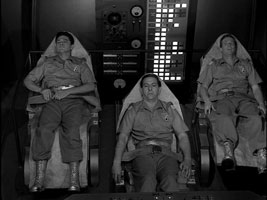 Matheson adapted another of his stories for "Death Ship", which stars Ross Martin (previously in "The Four of Us are Dying") alongside Twilight Zone veteran Jack Klugman ("A Passage For Trumpet", "A Game of Pool") and Fredrick Beir. The three men are the only crew of the spaceship E-89, traveling through a nearby star system in search of a new planet to help alleviate the overpopulated Earth. Shockingly, on the face of the thirteenth planet, they find the wreckage of a ship that looks exactly like their own and inside ... their own dead bodies. "Death Ship" presents an interesting concept, not so much in the setup but in the way it is addressed. Unfortunately, Don Medford's direction is sorely lacking, and the performances of the three leads are almost cartoonish. The hour-long script forces them into unnecessary bickering, and a story that would have been an intriguing piece is dragged out to the point where it is obvious and annoying. Klugman was so strong in his previous two episodes that it is painful to see him so ineffective here.
Matheson adapted another of his stories for "Death Ship", which stars Ross Martin (previously in "The Four of Us are Dying") alongside Twilight Zone veteran Jack Klugman ("A Passage For Trumpet", "A Game of Pool") and Fredrick Beir. The three men are the only crew of the spaceship E-89, traveling through a nearby star system in search of a new planet to help alleviate the overpopulated Earth. Shockingly, on the face of the thirteenth planet, they find the wreckage of a ship that looks exactly like their own and inside ... their own dead bodies. "Death Ship" presents an interesting concept, not so much in the setup but in the way it is addressed. Unfortunately, Don Medford's direction is sorely lacking, and the performances of the three leads are almost cartoonish. The hour-long script forces them into unnecessary bickering, and a story that would have been an intriguing piece is dragged out to the point where it is obvious and annoying. Klugman was so strong in his previous two episodes that it is painful to see him so ineffective here.
The first genuinely effective episode of the season comes from an unlikely source, writer Earl Hamner, Jr., who had previously contributed below average scripts in the third season's "Piano in the House" and "The Hunt". Starring Anne Francis (previously "The After Hours") in the title role, "Jess-Belle" is a tale of witchcraft set in an isolated farming community in the Blue Ridge Mountains. Jess-Belle has recently been scorned by her boyfriend Billy-Ben (James Best, previously in "The Grave" and "The Last Rites of Jeff Myrtlebank"), who now intends to marry another. Hopelessly in love and out of options, she turns to the rumored town witch for assistance in the form of a love potion. What sets "Jess-Belle" apart from similar stories, however, is that this is not a "be careful what you wish for" cautionary tale like the first season's forgettable "The Chaser". Here, Anne Francis creates a movingly tragic figure who realizes that the deal she has made is unfair to the man she genuinely does love. Hamner's writing is still bogged down with a bit too much down-home mannerism, and James Best is essentially just repeating his character of Myrtlebank; but in the hands of The Twilight Zone's most skilled director, Buzz Kulik, and anchored by the wonderfully talented Anne Francis, this somewhat straightforward story genuinely works and is one of the few bright spots of this otherwise tedious season.
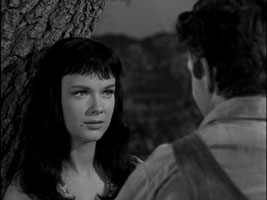 Charles Beaumont's third contribution to this season follows with "Miniature", starring Robert Duvall as Charley Parkes in a subtle but effective performance as a loner who finds himself obsessed with a mysterious dollhouse at a local museum. Charley lives with his mother and, while a competent employee, he does not "fit in" with his coworkers. In fact, he doesn't really fit in much of anywhere, and when he begins to see an animated world play out within the seemingly wooden dollhouse, he becomes unable to tear himself away from constantly observing it. Another example of an episode that would have worked much better in the half-hour format, "Miniature" survives mostly on the strength of Duvall's performance and remains tolerable in spite of the drawn out script. Due to legal troubles, this episode has rarely been seen in syndication, so it is nice to have it included on this set.
Charles Beaumont's third contribution to this season follows with "Miniature", starring Robert Duvall as Charley Parkes in a subtle but effective performance as a loner who finds himself obsessed with a mysterious dollhouse at a local museum. Charley lives with his mother and, while a competent employee, he does not "fit in" with his coworkers. In fact, he doesn't really fit in much of anywhere, and when he begins to see an animated world play out within the seemingly wooden dollhouse, he becomes unable to tear himself away from constantly observing it. Another example of an episode that would have worked much better in the half-hour format, "Miniature" survives mostly on the strength of Duvall's performance and remains tolerable in spite of the drawn out script. Due to legal troubles, this episode has rarely been seen in syndication, so it is nice to have it included on this set.
"Printer's Devil" follows in yet another adapted story from the prolific Charles Beaumont (originally published in 1951). Burgess Meredith ("Time Enough at Last", "Mr. Dingle the Strong", and "The Obsolete Man") plays Mr. Smith, or as we quickly learn, the Devil. He has come to the Earth (this time) to meddle in the affairs of a struggling newspaper editor, creating a supernatural typesetting machine that will make whatever story that is set into it come true, making it such that the Gazette is constantly on the edge of breaking news stories and certain to become wildly successful. Meredith carries this piece on his shoulders with a wonderful performance that balances quite a bit of humor with the genuine dread of making a deal with the Devil. The ultimate resolution is somewhat predictable but certainly not a cheat, and it is well worth watching to see Meredith at his best.
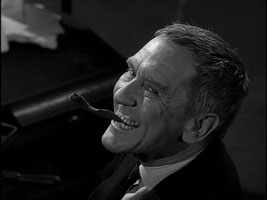 Serling himself returns with "No Time Like the Past", another in a long list of time travel stories. Dana Andrews is Paul Driscoll, a man living sometime in the future who has recently discovered the ability to travel backward in time. He chooses to use this power to return to pivotal moments in world history and change them, but various incidents occur that prevent him from accomplishing this task. Dismayed by this and frustrated with the war-torn world in which he lives, he decides to find a time in the past in which he can live in peace, but that decision has consequences of its own. Where the episode fails is that Driscoll's efforts to change the past don't make any sense. He tries to save the people of Hiroshima, but shows up about 5 minutes before the bomb is dropped. He tries to assassinate Hitler, but gets distracted by a nosey maid. The whole exercise rings hollow and seems inserted to the front of the episode to string it out for the hour-long timeframe. The second half of the episode, his final journey to the past, carries a little more weight but retreads too much territory already covered in "Walking Distance", a far superior Serling script.
Serling himself returns with "No Time Like the Past", another in a long list of time travel stories. Dana Andrews is Paul Driscoll, a man living sometime in the future who has recently discovered the ability to travel backward in time. He chooses to use this power to return to pivotal moments in world history and change them, but various incidents occur that prevent him from accomplishing this task. Dismayed by this and frustrated with the war-torn world in which he lives, he decides to find a time in the past in which he can live in peace, but that decision has consequences of its own. Where the episode fails is that Driscoll's efforts to change the past don't make any sense. He tries to save the people of Hiroshima, but shows up about 5 minutes before the bomb is dropped. He tries to assassinate Hitler, but gets distracted by a nosey maid. The whole exercise rings hollow and seems inserted to the front of the episode to string it out for the hour-long timeframe. The second half of the episode, his final journey to the past, carries a little more weight but retreads too much territory already covered in "Walking Distance", a far superior Serling script.
"The Parallel" is another Serling script that misses the mark. While his space capsule is in orbit around the Earth, Robert Gaines (Steve Forrest) disappears from monitoring screens and mysteriously shows up back on the Earth completely unharmed. More to his confusion, things are not exactly the way he remembers them. All the players are the same, but there are subtle differences in conversations from his past, modifications to his home, and even his own rank in the military. What has happened to him is pretty obvious and would be the subject of many successful science fiction stories, but here is falls very flat, with poor performances and an ending that completely cheats the audience out of the time spent watching the episode.
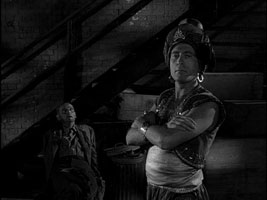 Newcomer John Furia, Jr. contributes the next story with "I Dream of Genie", an episode that starts off as a unique take on the classic tale but ultimately finds itself meandering around oft trodden paths. George P. Hanley (Howard Morris) is an average guy who is in love with his boss's secretary Ann (Patricia Barry, previously in "The Chaser). Everything changes for him when he is conned into buying a magical lamp, and from within an ornery genie appears to grant him a single wish. The setup is very solid as the genie has been around the block a time or two and explains to Hanley some of the wrong things that others wish for. Unlike "The Man in the Bottle" from the second season, the genie's intent is not to trick his master into making an ill-defined wish that will bring him nothing but heartache, and he suggests that Hanley give it some serious thought before making the final decision. Unfortunately for the viewer, he does give it serious thought, and we are forced to sit through his tedious daydreams as he plays out ill-fated scenarios that the genie already told him were bad ideas. The episode's resolution is somewhat unique, albeit telegraphed, but the journey to get there is way too long and ineffective.
Newcomer John Furia, Jr. contributes the next story with "I Dream of Genie", an episode that starts off as a unique take on the classic tale but ultimately finds itself meandering around oft trodden paths. George P. Hanley (Howard Morris) is an average guy who is in love with his boss's secretary Ann (Patricia Barry, previously in "The Chaser). Everything changes for him when he is conned into buying a magical lamp, and from within an ornery genie appears to grant him a single wish. The setup is very solid as the genie has been around the block a time or two and explains to Hanley some of the wrong things that others wish for. Unlike "The Man in the Bottle" from the second season, the genie's intent is not to trick his master into making an ill-defined wish that will bring him nothing but heartache, and he suggests that Hanley give it some serious thought before making the final decision. Unfortunately for the viewer, he does give it serious thought, and we are forced to sit through his tedious daydreams as he plays out ill-fated scenarios that the genie already told him were bad ideas. The episode's resolution is somewhat unique, albeit telegraphed, but the journey to get there is way too long and ineffective.
Jerry Sohl's first contribution to The Twilight Zone follows with "The New Exhibit", but like scripts before and since, it was technically credited to Mr. Macabre himself, Charles Beaumont. Like Serling, Beaumont was overworked and spread way too thin, but he was also facing something far more tragic: presenile dementia. As if he were trapped in The Twilight Zone himself, the prolific contributor would age 50 years in the next 3 and die of old age while only 38. This battle with fate forced him to farm out much of his work, and "The New Exhibit" is one such example. Martin Senescu (Martin Balsam) is a wax museum curator who has become obsessively attached to his "Murderer's Row" exhibit. When the owner decides to pack up shop and retire, Senescu gives the creepy wax figures a home in his basement. Feeling more like a script from Alfred Hitchcock Presents, "The New Exhibit" works largely because of Balsam's intense performance and the downright disturbing makeup and positions of the wax murderers. The end is predictable and a little disingenuous when compared against earlier scenes, but one the whole it is a decently grisly tale worthy of attention.
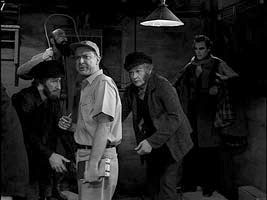 "Of Late I Think of Cliffordville" presents another Serling script (adapted from a story by Malcolm Jameson) that illustrates his fascination with returning to the past. Bill Feathersmith (Albert Salmi) is a ruthless and wealthy industrialist. At the age of 75, he has conquered everything he could possibly want and is bored with his life. Trading in his fortune, he makes a deal with Miss Devlin (Julie Newmar), an obvious incarnation of the Devil, to return to where it all began and restart the journey. For in Feathersmith's mind, it is not the having of riches that holds value but the acquiring of them. His request is granted, and he returns to Cliffordville in hopes of rising to power once more. "Cliffordville" suffers in many areas. By this point in the season, Herbert Hirschman had moved on to take a job in Europe, so the series had a new producer in Bert Granet. Director of Photography George T. Clemens was also off working on a different episode, unable to handle the load of hour-long episodes by himself, and so this episode was photographed by Robert W. Pittack. Finally, director David Lowell Rich was making his first and only appearance as director for the show. The result of all these factors is a jumbled tale that never works. Among other things, Salmi's "old" makeup is downright laughable as you can clearly see the hair bulges in his bald cap, and his "old voice" isn't much better. The characters simply aren't convincing, and the story does not assist as is presents disjointed and unnecessary reasons for the episode's final resolution.
"Of Late I Think of Cliffordville" presents another Serling script (adapted from a story by Malcolm Jameson) that illustrates his fascination with returning to the past. Bill Feathersmith (Albert Salmi) is a ruthless and wealthy industrialist. At the age of 75, he has conquered everything he could possibly want and is bored with his life. Trading in his fortune, he makes a deal with Miss Devlin (Julie Newmar), an obvious incarnation of the Devil, to return to where it all began and restart the journey. For in Feathersmith's mind, it is not the having of riches that holds value but the acquiring of them. His request is granted, and he returns to Cliffordville in hopes of rising to power once more. "Cliffordville" suffers in many areas. By this point in the season, Herbert Hirschman had moved on to take a job in Europe, so the series had a new producer in Bert Granet. Director of Photography George T. Clemens was also off working on a different episode, unable to handle the load of hour-long episodes by himself, and so this episode was photographed by Robert W. Pittack. Finally, director David Lowell Rich was making his first and only appearance as director for the show. The result of all these factors is a jumbled tale that never works. Among other things, Salmi's "old" makeup is downright laughable as you can clearly see the hair bulges in his bald cap, and his "old voice" isn't much better. The characters simply aren't convincing, and the story does not assist as is presents disjointed and unnecessary reasons for the episode's final resolution.
Before leaving the show, Hirschman had helped ease the writing burden by purchasing the script for a story that had already been televised almost a decade earlier. "The Incredible World of Horace Ford" was somewhat the antithesis of "Walking Distance". Horace (Pat Hingle) is an aging toy maker who lives in the past, forever remaining true to his boyish roots and longing to return to those days. As The Twilight Zone gets its grip on him and starts to slowly grant his wish, he finds that those days aren't exactly the way he has nostalgically remembered them all these years. Yet another example of a show that would work better as a half-hour, there is way too much padding in this episode. Pat Hingle does an effective job creating a man who acts like a boy, but the repeated emphasis of this fact to fill time takes the story from interesting to annoying. Straying dangerously close to repeating "Miniature", Reginald Rose's new ending for his story keeps it somewhat fresh, if a little too long.
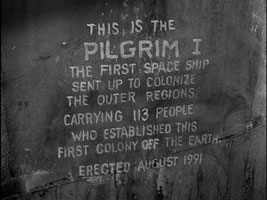 "On Thursday We Leave for Home" was Serling's favorite episode of the season, and in his opinion the only one worthy of any merit. While I think there are a few decent episodes to be found here, he's largely right. "Thursday" harkens back to what made The Twilight Zone so great in the first place. While it is set in the future and has a science fiction element to it, it is much more than a simple gimmick tale of something strange of futuristic. It's about real people and real emotions. James Whitmore plays Captain William Benteen, the leader of a stranded colonial party that has survived in isolation for 30 years on a nearby planet. They originally traveled to this planet to find a new place for humankind to live and perhaps discover new wonders, but the landscape proved harsh and unable to sustain any agriculture. Through his sheer force of will and determination, Benteen has kept 187 members of his party alive in spite of their fears. Not only has he kept them fed and sheltered, but he has kept their moral to a point where only a few of them succumbed to the madness of their circumstance. When a rescue party finally arrives to take them home to Earth, however, he becomes consumed with what will happen when they return. They will no longer live as a group, as a family, and he will no longer be their leader. Whitmore's performance is strong, Serling's writing is as eloquent as it was in the first season, and veteran Buzz Kulik's direction is spot on as usual. "On Thursday We Leave for Home" is a decidedly human tale told in a science fiction setting, and it is one of the season's most moving and effective.
"On Thursday We Leave for Home" was Serling's favorite episode of the season, and in his opinion the only one worthy of any merit. While I think there are a few decent episodes to be found here, he's largely right. "Thursday" harkens back to what made The Twilight Zone so great in the first place. While it is set in the future and has a science fiction element to it, it is much more than a simple gimmick tale of something strange of futuristic. It's about real people and real emotions. James Whitmore plays Captain William Benteen, the leader of a stranded colonial party that has survived in isolation for 30 years on a nearby planet. They originally traveled to this planet to find a new place for humankind to live and perhaps discover new wonders, but the landscape proved harsh and unable to sustain any agriculture. Through his sheer force of will and determination, Benteen has kept 187 members of his party alive in spite of their fears. Not only has he kept them fed and sheltered, but he has kept their moral to a point where only a few of them succumbed to the madness of their circumstance. When a rescue party finally arrives to take them home to Earth, however, he becomes consumed with what will happen when they return. They will no longer live as a group, as a family, and he will no longer be their leader. Whitmore's performance is strong, Serling's writing is as eloquent as it was in the first season, and veteran Buzz Kulik's direction is spot on as usual. "On Thursday We Leave for Home" is a decidedly human tale told in a science fiction setting, and it is one of the season's most moving and effective.
Charles Beaumont's final script for the season comes as yet another adaptation of one of his previously written stories, "Passage on the Lady Anne". Reuniting the wonderful Gladys Cooper with director Lamont Johnson from "Nothing in the Dark", "Passage on the Lady Anne" follows a young married couple as they try to rekindle their passion for one another by taking a prolonged cruise with one another. The two ignore warnings not to take this particular ship, and on board they find the passengers are all elderly couples giving their longtime favorite ship its farewell voyage. It isn't too difficult to see where the story is going, and the bickering of the young couple really isn't that interesting, but the cast of passengers give such wonderful and wise performances that the story is engrossing nonetheless. Pairing the great Wilfrid Hyde-White with Gladys Cooper was an inspired choice, and the two deliver touching performances as an elderly couple who has spent the best and worst years of their lives together in love.
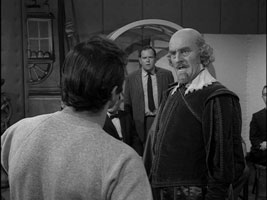 With two straight episodes that are pretty good, the fourth season of The Twilight Zone was in a position to close on a high note, and is does just that with the final episode of the season, Rod Serling's "The Bard". Much like the first season, the show concludes with comedy and does so quite effectively. As the saying goes, when in doubt, write what you know, and what did Serling know more about than anything else? Why, writing for television, of course. "The Bard" concerns itself with enthusiastic but failed television writer Julius Moomer (Jack Weston, previously "The Monsters are Due on Maple Street"). Moomer has all kinds of crazy or hackneyed script ideas, from a woman who is married for years to a zombie without ever realizing it to a retooling of the classic series Millionaire, changing it to The Multi-Millionaire and extending it to a full hour (doubtless a shot at the failed lengthening of this very series). While researching a potential script on witchcraft, Moomer stumbles on "Ye Book of Ye Black Arts" and finds the ability to conjure the Bard himself, William Shakespeare. Moomer sets his new friend -- "Bill Baby" -- to work on a great new series that will blow the lid off of television as we know it. Never taking itself seriously and poking fun and nearly every aspect of the industry, "The Bard" is a rare example of an humorous Twilight Zone episode that actually succeeds in its goal. It even boasts a wonderful turn by a young Burt Reynolds imitating the great Marlon Brando.
With two straight episodes that are pretty good, the fourth season of The Twilight Zone was in a position to close on a high note, and is does just that with the final episode of the season, Rod Serling's "The Bard". Much like the first season, the show concludes with comedy and does so quite effectively. As the saying goes, when in doubt, write what you know, and what did Serling know more about than anything else? Why, writing for television, of course. "The Bard" concerns itself with enthusiastic but failed television writer Julius Moomer (Jack Weston, previously "The Monsters are Due on Maple Street"). Moomer has all kinds of crazy or hackneyed script ideas, from a woman who is married for years to a zombie without ever realizing it to a retooling of the classic series Millionaire, changing it to The Multi-Millionaire and extending it to a full hour (doubtless a shot at the failed lengthening of this very series). While researching a potential script on witchcraft, Moomer stumbles on "Ye Book of Ye Black Arts" and finds the ability to conjure the Bard himself, William Shakespeare. Moomer sets his new friend -- "Bill Baby" -- to work on a great new series that will blow the lid off of television as we know it. Never taking itself seriously and poking fun and nearly every aspect of the industry, "The Bard" is a rare example of an humorous Twilight Zone episode that actually succeeds in its goal. It even boasts a wonderful turn by a young Burt Reynolds imitating the great Marlon Brando.
The fourth season of The Twilight Zone marked a decidedly low point in the show's run. Extending the episodes to an hour was a terrible decision that never once helped an episode and hurt most of them. With the departure of Buck Houghton, the absence of Rod Serling, and Charles Beaumont's personal troubles, the series was lost and bore little resemblance to the greatness that came before. None of the episodes stands apart as great, and only a few of them qualify as good. Watching them was a frustrating experience in futility, and it is a wonder the show survived for its fifth and final season.
PRESENTATION:
This "definitive edition" of the fourth season of The Twilight Zone is presented very much like the other seasons with a few significant changes. Once again, the episodes are presented in their entirety, but the closing advertisements for other network shows are no longer present, nor are the nostalgic public service announcements. Also, there are no instances of Serling acting as a corporate shill for the "too mild to filter" cigarettes of the previous season. Essentially, the episodes are presented without any extra material, save for a bumper at the halfway point. Before the credits, Serling returns as always to promote the upcoming episode (except on "I Dream of Genie" and "Passage on the Lady Anne"), but this time, the producers have intercut short clips from the actual episode's content. Unlike modern "next on" previews, these clips are not heavily edited together, but simply show one or two short scenes. Few of them are effective in actually conveying anything.
Like the original broadcasts, this fourth season release is in a 4:3 aspect ratio with a mono audio track. As before, the episodes have been re-mastered with, in many cases, staggeringly improved results. Fortunately, this release is not plagued with the videotaped episodes that looked so terrible in season two, and the audio and print issues from season three are also gone. In short, this season looks about as good as it possibly could. Some more screenshots:
| Old | New |
|---|---|
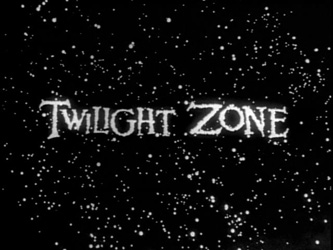 | 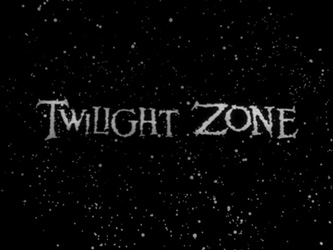 |
| Old | New |
|---|---|
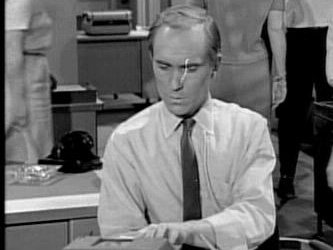 | 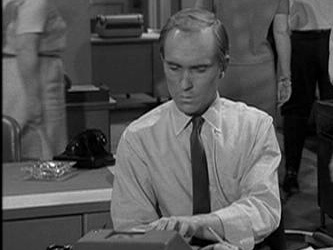 |
| Old | New |
|---|---|
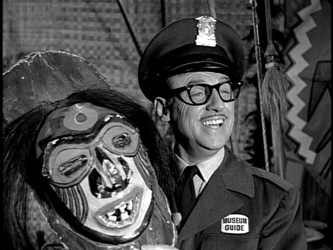 | 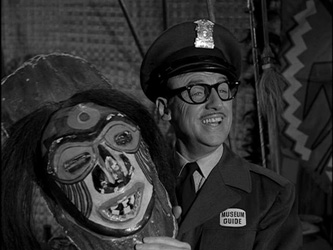 |
The menus are organized in the same simple format as the first three seasons. The montage of the series' classic moments runs once in the background of the main menu, and everything is easily selectable from the start. Each episode's menu has a scene selection screen that is well organized as well as a link to special features. Still missing is a "Play All" feature, but that is a minor oversight in an otherwise great layout.
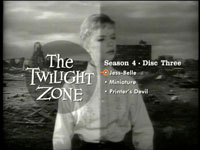 | 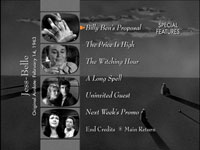 | 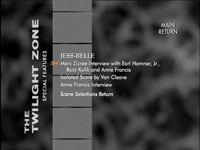 |
Of note, the episodes are closed captioned for the hearing impaired, but not the special features.
WHISTLES & BELLS:
This release of the fourth season includes mostly the same style of features as the first three releases: audio commentaries from stars and directors, recently produced radio dramas, excerpts from Marc Scott Zicree's interviews when researching his book The Twilight Zone Companion, and isolated scores from various composers. No more material from the Rod Serling lectures at Sherwood Oaks College is included, which is a disappointment, but there is a new addition to this set: filmed interview material with a few of the stars.
COMMENTARIES
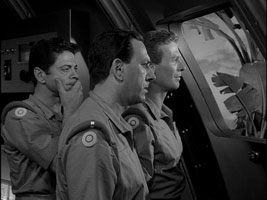 Unlike other seasons, there are only 2 commentaries to be found on this set, and one of them is not even full length. Marc Scott Zicree himself provides backing audio for "Death Ship", and it is clear that he feels differently about the quality of the episode than I do. What I find to be melodramatic and annoying he found to be moving and effective. Interestingly, while his research recordings come across as a bit sycophantic (obviously never intended for public use), this commentary is organized and coherent. It is immediately apparent just how much Zicree loves not only this episode but the series as a whole, and it translates well to this episode. There is no dead air of any kind as he is well prepared for this chance to talk about his beloved show, and he utilizes the opportunity to its fullest, sharing as much inside information as he can in the given timeframe. Many of the commentaries are pretty boring, but this one is a great listen, even if I disagree with his reverence for the specific episode.
Unlike other seasons, there are only 2 commentaries to be found on this set, and one of them is not even full length. Marc Scott Zicree himself provides backing audio for "Death Ship", and it is clear that he feels differently about the quality of the episode than I do. What I find to be melodramatic and annoying he found to be moving and effective. Interestingly, while his research recordings come across as a bit sycophantic (obviously never intended for public use), this commentary is organized and coherent. It is immediately apparent just how much Zicree loves not only this episode but the series as a whole, and it translates well to this episode. There is no dead air of any kind as he is well prepared for this chance to talk about his beloved show, and he utilizes the opportunity to its fullest, sharing as much inside information as he can in the given timeframe. Many of the commentaries are pretty boring, but this one is a great listen, even if I disagree with his reverence for the specific episode.
The only other commentary on the set comes from William Windham who had a fairly small role as the psychiatrist in "Miniature". He has very little to say of any note, and the commentary skips around to just the scenes in which he is filmed. There is a small bit of humor where he mocks how silly the extras look in one of the scenes, but for the most part, the feature is a waste of time.
RADIO DRAMAS
Once more there are 6 radio dramas from the Falcon Picture Group. What is interesting this time around is that the radio dramas are often superior to the actual episodes. In past seasons, the radio dramas had been adapted in a way that detracted from the original, but here it seems that Dennis Etchison has trimmed a lot of the excess fat from these hour-longs and turned them into more coherent and focused stories.
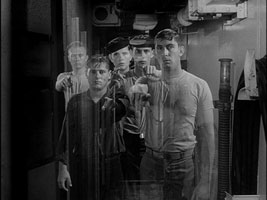 The first is for "The Thirty-Fathom Grave" (42:44) and stars Blair Underwood as the ship's captain. His performance is strong, and he does a good job carrying the story. Unfortunately, even shortened for radio, there isn't enough dramatic content to sustain the timeframe, and it falls pretty flat. "No Time Like the Past" (39:57) stars Jason Alexander as the time traveling Mr. Driscoll, and the opening exposition has been retooled to make a lot more sense. A situation with President Garfield is also adapted to be more logical and coherent.
The first is for "The Thirty-Fathom Grave" (42:44) and stars Blair Underwood as the ship's captain. His performance is strong, and he does a good job carrying the story. Unfortunately, even shortened for radio, there isn't enough dramatic content to sustain the timeframe, and it falls pretty flat. "No Time Like the Past" (39:57) stars Jason Alexander as the time traveling Mr. Driscoll, and the opening exposition has been retooled to make a lot more sense. A situation with President Garfield is also adapted to be more logical and coherent.
"The Parallel" (41:08) stars Lou Diamond Phillips, and while it follows essentially the same path as the original episode, the performances are more animated and far less annoying than the original. "Of Late I Dream of Cliffordville" (40:56) features H.M. Wynant as the brash Mr. Feathersmith, and it is a drastic improvement over the original. The story is more focused, the presentation is not saddled with poor performances and shoddy makeup, and the updated version is actually somewhat engrossing.
Mike Starr plays the title character in "The Incredible World of Horace Ford" (34:53), and it has been shortened significantly. The original episode was way too long and kept repeating itself, but thankfully most of that has been dropped to present a tale that is more engaging and easier to follow. Finally, "The Bard" (37:10) features John Ratzenberger in a fun update to the story. This time Moomer suggests that they should make a series with Robert Redford as a prize fighter, and if they want to skew younger ... Adam Sandler. Ratzenberger is very good in the role, but Jack Weston is hard to replace. Still, it's a fun one to listen to. I can't wait to see "Pick Your Own Embalmer" ... it's a quiz show!
ZICREE INTERVIEWS
There are 7 interview segments on this fourth season release taken from Zicree's personal archives, the first of which is 16 and a half minutes with new producer Herbert Hirschman on the season premiere "In His Image". Hirschman knew Serling from their days on the groundbreaking Playhouse 90, and he talks about how fond he was of the writer. He also notes how difficult it was to work with him from across the country in Ohio and how he knew Serling was capable of far better. If you have not seen the other episodes on this set, you should watch them first and then return to this commentary as he gives away the resolutions to "Death Ship", "Jess-Belle", and "Mute" during this discussion.
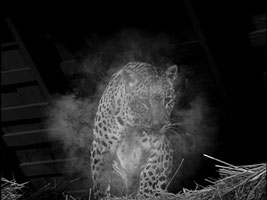 Ross Martin, star of "Death Ship", talks for about 20 minutes on his episode. He was cast by the director Don Medford personally and really enjoyed working with him on the project. He talks mostly about working with child actors and how he uses instances in his own life for motivation when performing.
Ross Martin, star of "Death Ship", talks for about 20 minutes on his episode. He was cast by the director Don Medford personally and really enjoyed working with him on the project. He talks mostly about working with child actors and how he uses instances in his own life for motivation when performing.
There are three interview segments on "Jess-Belle". The first is with the writer Earl Hamner, Jr. (12:30), who notes that he was urged by Hirschman to write the episode from idea to finished project in under a week. There were no story revisions, because there was no time. While this episode worked out, it underscores the way things were proceeding during this season. Director Buzz Kulik is also present for just over 10 minutes, and he discusses his casting process and his own superstitions about strange backwoods communities. He has very positive memories of the episode and shares some stories about working with the leopard. Finally, star Anne Francis talks for 17 minutes, and she is incredibly gracious and energized. She talks about her prior experience working with large cats during MGM promotional photo shoots and how she was prepared to do "Jess-Belle". She also makes note of how the industry has changed a lot since those days and how television is not the collaborative effort it once was (the interview is from 1978).
Burgess Meredith speaks for 10 minutes on "Printer's Devil", and when Zicree first mentions it, his demeanor completely changes, much more interested in talking about it than some of the other footage on the other DVD sets. He discusses how they accomplished the flaming finger trick and how hard they worked to inject effective humor into the story while keeping the Devil still somewhat menacing. After speaking on it for a few minutes, he seems to settle back into being irritated by the interview process.
Finally, Pat Hingle talks with Zicree for a good 22 and half minutes on his performance in "The Incredible World of Horace Ford". A lot of it is pretty rambling, but he speaks about how he got the job and how he prepared for the role, how much he liked the director, and how proud he feels to have been a part of the show.
VIDEO INTERVIEWS
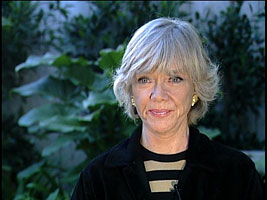 New to this set are 4 video interviews with stars from the show. Morgan Brittany (7:25) has a pretty small role on "Valley of the Shadow", but nonetheless she talks about what it was like to be on the show and what a major effect it had on her career. Noting that her son saw her episode when he was 8 and watched it intently, she mentions that The Twilight Zone is about human emotion, not car crashes and special effects. This is most ironic as "Valley of the Shadow" not only contains numerous special effects, but a car crash as well. Still, the point is not lost.
New to this set are 4 video interviews with stars from the show. Morgan Brittany (7:25) has a pretty small role on "Valley of the Shadow", but nonetheless she talks about what it was like to be on the show and what a major effect it had on her career. Noting that her son saw her episode when he was 8 and watched it intently, she mentions that The Twilight Zone is about human emotion, not car crashes and special effects. This is most ironic as "Valley of the Shadow" not only contains numerous special effects, but a car crash as well. Still, the point is not lost.
Anne Francis (8:10) speaks on both "The After Hours" and "Jess-Belle" and comes across as a very likeable person who genuinely enjoyed being a part of the show. She was very fond of Serling and talks about what made him such a special talent. She jokes that when they make "Jess-Belle" the musical, now that she is too old to play the lead, she would like to be buried in makeup and play the witch.
Paul Comi (8:27) has a smaller role in "The Parallel", but starred in "The Odyssey of Flight 33" and "People are Alike All Over". He talks about each for a short period of time, noting how he was fascinated by Serling's writing and felt like working on the show was genuinely something important in the world. Interestingly, he freely admits that the hour-long shows don't work.
Finally, there is an interview with John Furia (9:17), author of "I Dream of Genie". At the time he wrote the episode, Rod Serling was the gold standard, he says, and everyone wanted to be like him, not just as a writer but a public figure. He goes into some detail on his process as a writer and the way he struggled to find an ending to "Genie".
ISOLATED SCORES
The final significant extra features are the isolated scores for 16 of the 18 episodes! Like the previous sets, pretty much every episode that wasn't scored with stock CBS music is presented as an alternate track on the discs, including some of the stock music as well. Unlike other seasons, though, there isn't a great deal of unique and original music here. Most of it is the same music used in other episodes and a lot of recycled work from Fred Steiner. Still, it's nice to have it included on the set.
 | 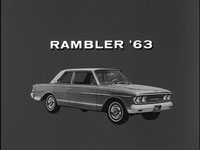 | 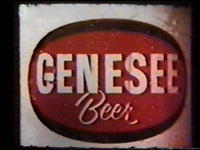 |
OTHER MATERIAL
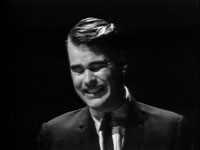 Once again, Image Entertainment has taken care to provide even more additional material, some scattered throughout the discs, but most gathered together on the end of Disc 6. On Disc 2, accompanying "He's Alive" is the same Rod Serling blooper included on the first season release. On Disc 3, segments from the colorized syndicated version are included, where scenes from within the animated dollhouse have been colorized. It isn't particularly interesting to watch, but it is curious to see how it looked in that format.
Once again, Image Entertainment has taken care to provide even more additional material, some scattered throughout the discs, but most gathered together on the end of Disc 6. On Disc 2, accompanying "He's Alive" is the same Rod Serling blooper included on the first season release. On Disc 3, segments from the colorized syndicated version are included, where scenes from within the animated dollhouse have been colorized. It isn't particularly interesting to watch, but it is curious to see how it looked in that format.
The rest of the special features are pretty limited in comparison to previous releases. From the November 20th, 1976 episode of Saturday Night Live is a segment called "The Twilite Zone" (4:33) with Dan Aykroyd as Serling narrating his own twisted attempt to trap three Hollywood starlets in a hotel room. There is a 30-second Genesee beer commercial with Serling promoting the product. And like the previous release, there is another 6-minute promo of Serling promoting his "Famous Writers School", a home-study correspondence course in writing. This version is much lower quality, but it is still a compelling piece of our television heritage.
Finally, as with the other seasons, there are 5 minutes of ad billboards, 17 photographs from the season, and "Our Changing Weather", a comic book in .pdf format for use on a personal computer's DVD drive.
CONCLUDING THOUGHTS:
Without producer Buck Houghton and with Rod Serling distracted by other projects and living in Ohio, the fourth season of The Twilight Zone is just short of disaster. The new hour-long format is completely unsuited for the show, and just about every episode suffers from it. There are a few solid efforts in this season -- "Jess-Belle", "Printer's Devil", "On Thursday We Leave for Home", and "The Bard" -- but for the most part, it is largely a forgettable season that is not emblematic of what the series is really about. Further detracting from this release is that most of the interesting extras have already been included on previous sets. At this point in the release process (the fourth season of five), it is unlikely you are turning to me for advice on what to do, but if you haven't made up your mind just yet, I suggest you Rent It.
Included in the set are the following episodes:
Disc One
Disc Two
Disc Three |
Disc Four
Disc Five
Disc Six |
|
| Popular Reviews |
| Sponsored Links |
|
|
| Sponsored Links |
|
|
| Release List | Reviews | Shop | Newsletter | Forum | DVD Giveaways | Blu-Ray | Advertise |
|
Copyright 2024 DVDTalk.com All Rights Reserved. Legal Info, Privacy Policy, Terms of Use,
Manage Preferences,
Your Privacy Choices | |||||||









